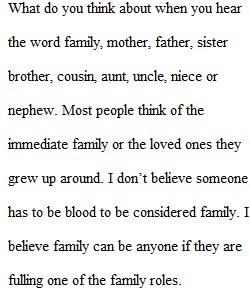


Q In the assignment you just finished up you were asked to summarize and analyze the argument of another person or group of people; now you will have a chance to construct an argument of your own. The subject of this essay is definition—the act of assigning meaning to a term—and the impact definitions have on the way people think and act. The Norton Field Guide to Writing explains that “defining something says what it is—and what it is not.” If we think more deeply about definition, we might agree with writer and teacher Edward Schiappa, who argues that “definitions are rhetorical [persuasive] in the sense that they function as strategies of social influence and control. Definitions tell us when it is “proper” or “correct” to use words in a particular way, and, in doing so, tell us what is in our world.” This short writing assignment asks you to identify and examine a term or phrase in order to reveal the “strategies of social influence and control” embedded within the term and its use. For this assignment, choose a word of your own, one that occupies a place in your life or that you hear on a regular basis. Often, the words closest and most familiar to us demand the most scrutiny. Consider a word used to identify or label a person, a political idea, a state of being, a social class, an occupation, or a lifestyle. Situate your term within a context, and use this opportunity to take a position. Definitions function as strategies of social influence and control; that is what we are here to investigate with this assignment. Guidelines for choosing a term: select a word or short phrase to investigate and analyze within a context. For example, you could research the term marriage within the context of the recent changes to our national laws, or research the term life in the context of abortion. We will be looking at other examples in class. Pick something you can examine, something that is controversial, debated, misused, misunderstood, or used to identify groups of people. You should be able to situate your term within some contextual factor. Think about, who uses the word? when is it used? when is it not used? -Your final draft should be between 1,200 and 1,500 words, double-spaced. -Your final draft should include a Works Cited/References page containing references to 3-4 popular and/or scholarly sources. -Your rough draft is due to the "Peer Review #4" discussion board by the end of the day on Wednesday, February 12. -Your final draft is due to this submission link by the end of the day on Sunday, February 16. Here’s a short list (you may select a term from this list or pick your own). The word or phrase comes first and is followed by contextual examples. “A good time.”: the heroin epidemic, thrill-seekers “Man up!”: gender roles, expectations, the myth of male power Any political label—Republican, Democrat, Socialist, Liberal, etc.: culture, society Etiquette: world travel, certain situations Family values: gender dynamic, paternal responsibility, tradition Feminist: societal influence, misunderstood, bias Justice: the death penalty, torture, police brutality, solitary confinement Lady-like: gender roles, expectations, wage discrimination Patriot: standing for the national anthem, Standing Rock, terrorism Rich: success, capitalism, classism, emotional wealth Security: Syrian refugee crisis, Mexican-American border wall, immigration Sport: beer pong, corn hole, athlete Tradition: standing for the national anthem, Columbus Day, marriage Assault Weapon: the 2nd amendment, gun violence Other words that are being thrown around a lot: inclusion, access, privilege, leader Consider the following questions to get started: 1. Describe the situation and/or context under which you encountered this word or idea. What drew your attention? In what ways did the term strike you as unstable or contestable? 2. Offer at least one lexical definition and one example of usage for the term using a range of sources, such as newspapers, political documents, dictionaries (print and online), encyclopedias, conversation, fiction, popular culture references, lyrics, etc. (One source must provide historical and etymological data for the term; e.g., the American Heritage Dictionary or the Oxford English Dictionary.) 3. Locate and describe any underlying reasons for the difference in usage. What kinds of personal, political, social, or cultural beliefs are at work? Economic, gender-based, racial? How do people in different groups define the word or phrase differently, and what consequences does that have? Who are these people? What contexts are they reacting to? Are there limitations or rules for its use? Explain. 4. Identify one or more usages that feel familiar or reasonable to you. Explain why this usage seems most appropriate. How or why might you use the term differently? 5. Remember, to define your term clearly you may have to define other terms. What concepts or events would your audience have to have previous knowledge of, and what information needs to be explained? 6. Remember to always italicize a word when talking about You wouldn’t need to do this when using the word normally in a sentence. Please use this link to post the final draft of your Rethinking Definition essay AS AN ATTACHMENT. Rubric Rethinking Defintion Rubric Rethinking Defintion Rubric Criteria Ratings Pts This criterion is linked to a Learning OutcomeDefinitional Argument The writer uses definition to highlight an argument, take a side, and make a call-to-action. 35 pts This criterion is linked to a Learning OutcomeConsideration of the Rhetorical Situation The writer makes clear their purpose for writing, gives context surrounding their argument, considers their specific audiences' prior knowledge and needs. 35 pts This criterion is linked to a Learning OutcomeFormat & Structure The essay is 1,200-1,500 words, correctly follows either the style of MLA or APA formatting, includes 3-4 sources cited in-text and on a Works Cited/References page. 20 pts This criterion is linked to a Learning OutcomeDraft & Timeliness The writer submitted a rough draft for peer review and met all required deadlines. 10 pts Total Points: 100
View Related Questions